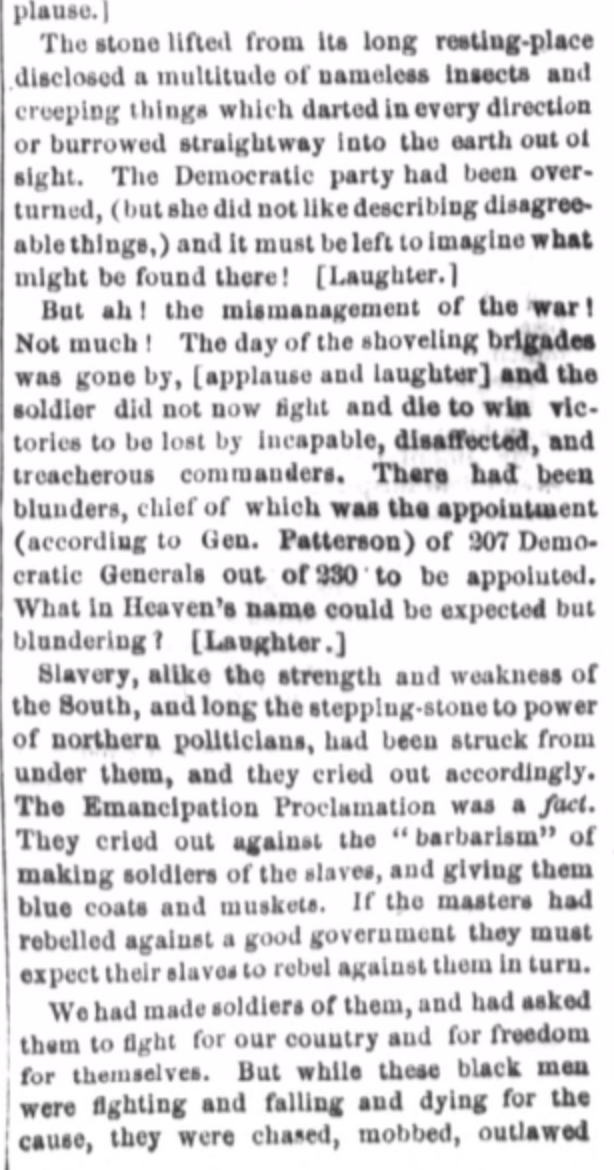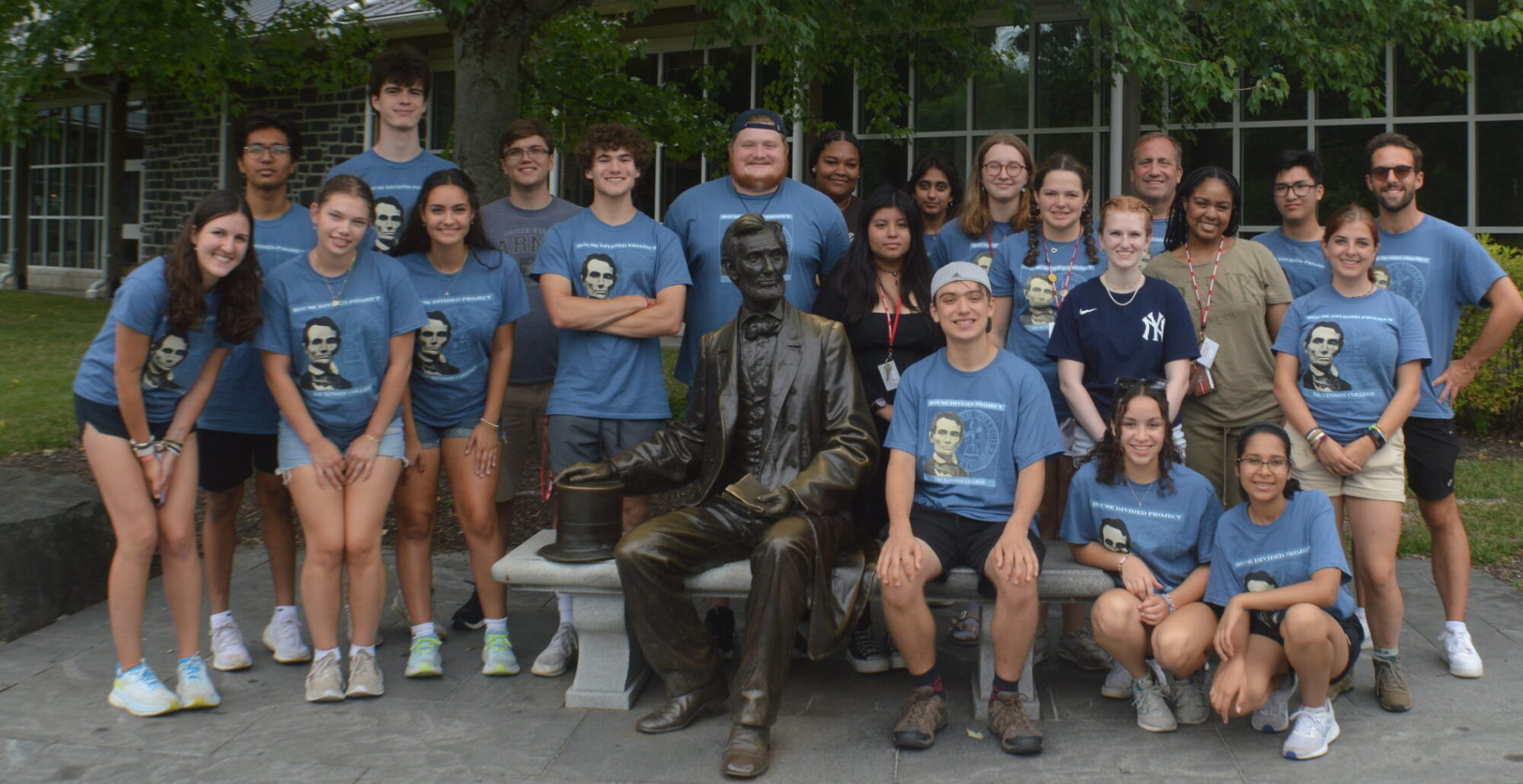Compromise! Let no man prate of compromise. Defeated by ballots, the South had appealed to bullets. Now let it stand by that appeal. There was not an arm of compromise in all the North long enough to stretch over the sea of blood and the mound of fallen Northern soldiers to shake hands with their murderers on the other side!
INTRODUCTION
Anna Dickinson (1842-1932) was the first woman ever to offer a political speech in the chamber of the US House of Representatives. The young Pennsylvania native was only 21 years old at the time. Dickinson delivered her speech, “The Perils of the Hour,” on January 16, 1864, not only before members of both the House and Senate, but also with President Lincoln and many of his cabinet in rapt attendance. Despite her age and gender, Dickinson had became a celebrity orator, well known for her effective support of Unionist and Republican candidates. But Dickinson was a radical and had been an occasional critic of the Lincoln Administration’s cautious policies regarding slavery, so there was a real element of drama in her appearance in early 1864. As young 13-year-old girl, Dickinson had published her first writings in William Lloyd Garrison’s abolitionist newspaper, The Liberator. Now, speaking before most of official Washington, the young woman continued to press for emancipation and civil rights, as she had done throughout her life.

But Dickinson also used the occasion to provide a kind of endorsement for President Lincoln and his potential second term. Later during the reelection campaign, Dickinson occasionally seemed to regret that endorsement –and never stopped pushing for more progressive policies on race and slavery– but she remained loyal to the Unionist effort. For a few decades after the Civil War, Dickinson remained an orator and writer, but never again achieved the same level of celebrity. She also struggled with poor health and depression. Dickinson never married and ultimately became estranged from her sister who at one point had her committed to an asylum. She then lived quietly for the last forty years of her life with friends in central New York, before her death in 1932.
SOURCE FORMAT: Public speech (excerpt)
WORD COUNT: 1,357 words
…Honor to the gallant defender of his country’s flag, whether he has heard the fearful storm of storm and shell at Antietam, or followed Rosecrans through the fierce and doubtful contests of the two years past – whether he fought at Gettysburg or followed Grant, whose victorious eagles had never yet retreated! [Prolonged applause.] The soil was sacred where our heroes fell. They should be honored while living and their memories revered when dead. They had died that the nation might live.
But for what did they fight and for what had they died? In order that, in the language of the President, “good government might not perish from the earth.” In 1776 our independence was asserted, but 1861 was the beginning of liberty. To-day we were fighting an oligarchy built upon the degradation of four millions of black men and eight millions of white men. Liberty threatened, had seized and wielded the only weapon of attack or defence – liberty. It was for slavery they were contending, we for liberty, and God save the right! [Applause.]
We were told that the war was for the Constitution and the Union, for the Government and the flag. True we were fighting for a Constitution, but for a Constitution whose spirit should be liberty. True we were fighting for a government, but for one which should crush the oppressor and secure freedom and protection to the weak and the oppressed. True, we were fighting for a flag, but for a flag which should welcome and make glad the suffering and oppressed of all the world. To-day we were fighting for a Government too august for any but freemen.
There were those who professed to have doubts that we would win. They said, “Let us control affairs, and a different order of things will prevail.” Nobody doubted it! We had tried them. Did not the old time occupants of the seats of power remember that when their standard-bearer, one James Buchanan by name, was President, treason was permitted to arm itself against the nation, our ships scattered to distant seas, our troops far removed, our arms stolen, our Treasury robbed and the Government a beggar in the market at twelve per cent? The former friends and allies of these men who now complain of corruption and fraud are guiding the hosts of rebellion, and the different between them was, that one stood as perjurers and the other as cowards! [Ap-plause.]
The stone lifted from its long resting-place disclosed a multitude of nameless insects and creeping things which darted in every direction or burrowed straightaway into the earth out of sight. The Democratic party had been over-turned, (but she did not like describing disagree-able things,) and it must be left to imagine what might be found there! [Laughter.]

But ah! The mismanagement of the war! Not much! The day of the shoveling brigades was gone by, [applause and laughter] and the soldier did not now fight and die to win victories to be lost by the incapable, disaffected, and the treacherous commanders. There had been blunders, chief of which was the appointment (according to Gen. Patterson) of 207 Democratic Generals out of 230 to be appointed. What in Heaven’s name could be expected but blundering? [Laughter.]
Slavery alike the strength and weakness of the South, and long the stepping-stone to power of northern politicians, had been struck from under them, and they cried out accordingly. The Emancipation Proclamation was a fact. They cried out against the “barbarism” of making soldiers of the slaves, and giving them blue coats and muskets. If the masters had rebelled against a good government they must expect their slaves to rebel against them in turn.
We had made soldiers out of them, and has asked them to fight for our country and for freedom for themselves. But while these black men were fighting and falling and dying for the cause, they were chased, mobbed, outlawed and hunted to death by a Union-saving — [drowned in applause.] With what sublime patience these down-trodden people had waited for the tardy justice of the nation. We had heard long the sharp cries of torture coming up from the house of bondage. We had heard this. What was it to us? They had long stretched their hands towards us for help. We cared not and heeded not. Now we needed them – who could say how much! At last we were prepared to say, “You have suffered enough; henceforth we stand out of your way and let you fight for your rights and your race.” Dying for the county, they should be recognized as citizens thereof. They should be granted the land rightfully theirs by centuries of labor.
Doing a soldier’s duty, the black man should have a soldier’s pay. Burdened with a man’s responsibilities, he should have a man’s rights. No acts of Congress, no proclamation of amnesty to defeated rebels, should interfere. A constitutional amendment should shield him, from a tribunal which proclaimed that he “had no rights which white men were bound to respect.” This was not charity nor generosity; it was simple justice. These slaves were made free, but not men. They were declared liberated, but were held at the mercy of pro-slavery tribunal. It was useless to say that this matter would take care of itself. We should attend to it ourselves. In 1787 slavery was supposed to be almost dying. It did not die, and the little draft then let open had kindled a tempest of consuming fire. This slavery was not to be left dying at the end of the war, but dead and buried, its epitaph written by the point of the sword and the bayonet. [Applause.]
The statesmen of the South had been wiser than ours. The South had proved herself sharper than the sharpest Yankee. The South had had sixty years of Presidents to our twenty four; eighteen Supreme Judges to our eleven; twenty-four presiding of the Senate to our eleven; twenty-three Speakers to our twelve. It had trampled on the Indians, and assailed Mexico, in the interest of slavery. It had grasped the virgin soil of the territories, to be polluted by slavery, and sought to convert the flag of freedom into the emblem of oppress-sion.
It had sustained freedom of speech by rifling the mails and maiming and murdering innocent men for a simple expression of opinion. It had overthrown the rights of the people in the Territories. It had shut out schools and churched, these being incompatible with the accursed system. It had come into our pulpits and made the truth a lie. It had made the Senate-chamber a scene of blood. It had tempted, used, and flung away some of the noblest minds in the North. Cringing, slimy creatures might now or hereafter wriggle their way into the Hall of representatives, but hence-forth slavery would get no more great men – no more majestic souls to ruin.
Compromise! Let no man prate of compromise. Defeated by ballots, the South had appealed to bullets. Now let it stand by that appeal. There was not an arm of compromise in all the North long enough to stretch over the sea of blood and the mound of fallen Northern soldiers to shake hands with their murderers on the other side! (Applause.) These dead heroes had fought and fallen that the cause might succeed.
Their bodies had been shattered that the body politic might be made perfect. We must continue the work dropped from their nerveless hands. Like the noble Curtius, they had thrown themselves into the black chasm opened by slavery, and as coming ages thread the spot, their voices will say, “Tread lightly, tread lightly, for the martyrs of liberty sleep beneath.”
This was pre-eminently a people’s war. It was guided by the man of the people, who had never been behind the great heart of the people. We had done much, and all was hopeful before us. Granted that we had much yet to do, we had the man to complete the grand and glorious work, and that work was left for his second term of office. [Tremendous and long-continued applause.]
CITATION: Daily National Republican, January 18, 1864, available FULL TEXT via Chronicling America or Gracie Perine, Anna E. Dickinson (Fall 2021)
DISCUSSION QUESTIONS
- How did Dickinson argue that the Civil War was about far more than merely a fight for union?
- Was Dickinson endorsing Abraham Lincoln at the end of her speech when she referred to him as “the man of the people”?
- In an era when no American women were voting in federal elections, what was the significance of the invitation to Anna Dickinson to speak before a joint session of Congress?
FURTHER READING
- FEATURED COLLECTION: Anna E. Dickinson (Gracie Perine, ’23)
- James Harvey Young, “For And Against Lincoln” (MVHR, 1944)
- J. Matthew Gallman, America’s Joan of Arc (2006) [Google Books]
- Lois Leveen, “The Civil War Oratorical Wunderkind,” New York Times Disunion, May 21, 2013
- STUDENT CLOSE READING: By Gracie Perine (’23)
- Handout –1864 Speeches
